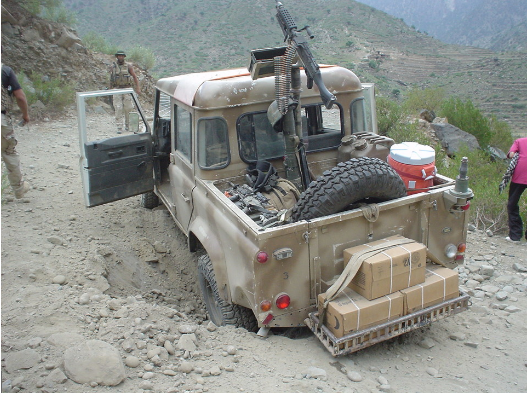Today I have a message of importance. I would like to introduce you to David Clukey, a true American hero.
This down to earth gentlemen, unassuming, soft-spoken, Green Beret retired after 20 years of service. Does not fit the bravado of the Hollywood stereotype soldier.
As an old Veteran, and businessman myself, and publisher of GLA News I can tell you without reservation he has a solid message for all G.I’s transitioning to civilian life.
Roger that David…
Understand Your Environment
We were casually laughing in light conversation as we neared the final turn on the unimproved riverside road before it straightened and guided us to the relative safety of our newly established firebase.
The explosion violently launched our modified Land Rover into the air and gravity slammed the tail end of our vehicle into the large crater it generated.
We couldn’t see anything through the thick dust, and everyone inside the vehicle exclaimed in surreal choreography, “oh expletive,” followed immediately by “are you ok?”.
We quickly assessed ourselves for injuries and awkwardly exited our canted vehicle to position ourselves for a potential follow-on attack.
This was the second month of my first combat deployment in 2004, as an inexperienced U.S. Army Special Forces AKA “Green Beret”, Team Leader assigned to the northern-most and most remote outpost in Afghanistan. It was nestled in the Kunar River Valley just a few miles away from the northwestern Pakistan Border.
Special Forces are first assessed and selected, and then complete up to 2 years of physical, tactical, cultural, and language training to work on elite 12-man teams. Special Forces Teams excel in austerity as masters of Unconventional Warfare (UW)[1].
Due to Special Forces’ low signature, cross-functional nature with trained experts in weapons, communications, medical, engineering and intelligence, and inherent UW expertise with the ability to train indigenous forces, they are a great option for operations in remote and contested areas.
During this deployment, we built a U.S. base from scratch out of a qalat (a fortified mud and brick compound), and trained local Afghans to assist us aggressively pursue terrorist groups who previously enjoyed uncontested safe haven in the remote and mountainous area.
It was in this setting, I developed a firm appreciation of the first Special Operations Forces (SOF) Imperative, “Understand the Operational Environment”; among many other lessons learned.
…After the improvised explosive devise (IED) detonated, we quickly realized how lucky we were, but more importantly, that we were doing things in a manner that did not acknowledge the true nature of our operational environment.
In combat or in business, you must consider your operational environment. Mistakes and oversights in the business world may not be as unforgiving as in combat; however, in business not understanding the operational environment may result in fiscal and plausible ramifications.
Bottom Line: It’s ok to assume calculated risk, but unhindered success is better realized when you consider the situation, implications, and environment in your calculations. Simply, understand your environment. Always weigh the risk vs. reward in your assessments, and think about the things you can do to better-set conditions in your advantage.
[1] Joint Publication 3-05 defines Unconventional Warfare as activities conducted to enable a resistance movement or insurgency to coerce, disrupt or overthrow a government or occupying power by operating through or with an underground, auxiliary, and guerrilla force in a denied area.nt.
Today

Six Considerations for Transitioning Veterans
Recently, I have been approached by many transitioning or recently transitioned military service members seeking advice about my transition (ongoing) from the military. This short article captures key topics I generally discuss with those who reach out to me in an attempt to more broadly assist others as they transition.
First and foremost, I do not consider myself a subject matter expert or authority on transitioning from the military. What’s included in this short article is based exclusively on my personal experiences. It’s not a cookie-cutter approach, a silver bullet nor an all-inclusive list. In order to keep it succinct (bathroom reading); I cover topics in a bulletized manner and readers may find colorful characterizations to reinforce points:
1. Physical, Mental and Spiritual well-being: if you are not out of the military yet, make sure you update your medical records and schedule appointments to annotate everything, throw away your pride and take care of yourself and your family. It’s ok, you’re not a sugar-honey-ice-tea -bag for doing this.
Separately, but on the same topic of physical health, I recommend selecting a sustainable physical activity you enjoy doing and staying with it for the long haul. I had to swallow my pride and stop doing Cross-Fit and competing with 20-year old’s as my 44-year-old, over-used and beat up combat chassis (body) kept telling me – STOP IT!!! Make it easier on yourself and pick something you can sustain and ENJOY, but please don’t stop training or working out.
Mental Health is extremely important especially with the obscenely high and ever-increasing level of Veteran suicides; BL, if you feel like you need to see someone – be seen. There is zero reasons to suffer in silence. Additionally, outside of mental health providers there are many alternative training programs out there these days that teach time tested practices to “struggle well”. Attend and complete a program if you feel you need to, there is no shame, only pride in knowing you confronted your demons, didn’t let them defeat you, and you chose to optimize yourself and your life. You deserve it.
2. Finances: if you are still in, start saving and adapting your lifestyle. If you think companies are going bang down your door to hire you because you are part of the exclusive 1% of U.S. society who volunteered to serve, …let me crush that notion…not happening. You bring leadership, skills and invaluable experience, but you are now seeking a job just like everyone else. If you are retiring, anticipate a one-month gap in pay coverage, it could take longer. I recommend networking, establishing a professional LinkedIn account, and composing a resume. Veteran job fairs are a great start for networking and to see the diverse options of what’s out there. Additionally, there are many resume advice websites on Mr. Google that can assist Veterans to translate military accomplishments to civilian speak.
3. Don’t rush to failure: Financial situations play a significant role in this, but if you can afford to do it, my unsolicited advice is to not rush into anything. Take your time, RELAX and figure out what you want to do and what makes you happy. I’m not saying to not find a job to pay the rent, but it doesn’t have to be your second career path. The caveat is counter to what many veteran transition programs suggest; however, for me taking time after my retirement to decompress made all the difference. It enabled me to reconnect with myself, my family, and set my course to pursue things deliberately and on my own terms. It also enabled me to address many of the health issues I put on the shelf and would deal with “later” during active duty.
4. Give Back: I recommend becoming active in your local Veterans community and to seek other volunteer opportunities. You have a rich story and unique experiences, share them productively through volunteer efforts. I further recommend vetting and screening the right Veteran’s Service Organization to donate your valuable time to; there are many out there, some are much more constructively active in communities than others.
5. Do things that make you happy: Life is short, you as a Veteran have a much greater appreciation about the value of life than most – do things that make you happy. Constructive things. This goes for leisurely pursuits as well as business. Understand your time is extremely important. I suggest committing your time to things where you find the most fulfillment. With this in mind, don’t do what you think others expect you to do, pave your own way.
Case in point, following his retirement a friend of mine was employed at a very well-paying job where he became miserable, overweight, time-constrained and remarkably unfulfilled. He had a self-actualization moment and made the life-changing decision to pursue something he loves and is passionate about. He is now the most well rounded (physically, spiritually, and mentally), satisfied and fulfilled person I know.
6. Prioritize your family: although number six on the list, this it is paramount. For you married people and those in long term relationships, now is the time to catch up on your honey-do list, demonstrate your gratitude for deployments, long hours, and other things that took you away from home that your significant others and your kids endured. Don’t ever miss an opportunity to connect and let them know how important they are to you.
A final consideration, the transition is difficult: you will feel alone, struggle with finding a new purpose, and may feel a level of guilt. IT’S OK!!! You are outside your comfort zone and in a new environment and a different culture. Not many people who have not served will be able to relate to or understand what you’ve been through. Be the positive example to represent your service and sacrifice well. Understand there will be challenges, but also understand you are NOT ALONE and all transitioning Veterans struggle. Be constructive and find your new purpose.
I personally struggled upfront, but now find my decision to retire the best decision I ever made. Take your time and be grateful for what you have experienced as a result of your service. Be optimistic about new opportunities you can embrace as a former military service member with a much broader perspective.
I hope this helps…












